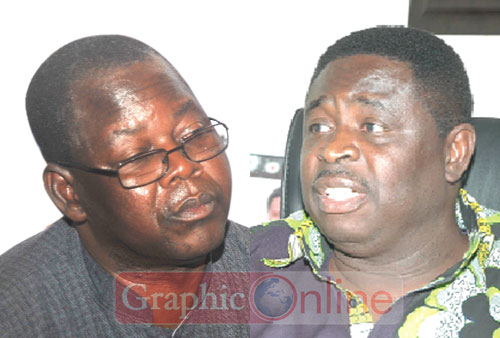Benefiting from funds earmarked for public services: MPs charged to explain to constituents
 The Executive Director of the Ghana Integrity Initiative (GII), Mr Vitus Azeem, has asked parliamentarians to explain to their constituents why they benefit from a share of all the funds earmarked for the delivery of public services.
The Executive Director of the Ghana Integrity Initiative (GII), Mr Vitus Azeem, has asked parliamentarians to explain to their constituents why they benefit from a share of all the funds earmarked for the delivery of public services.
Advertisement
These funds include the Ghana Education Trust Fund (GETFund), the National Health Insurance Fund and the District Assemblies Common Fund (DACF).
He has also charged Ghanaians to demand from their MPs the details of how the money they benefited from was spent.
He said the disclosures were necessary in ensuring that MPs were accountable to the people they represented.
Mr Azeem made the demands in a presentation on “Political Accountability and Good Governance” on the third day of a public lecture organised by the Ghana Academy of Arts and Sciences (GAAS) on the theme: ‘Accountability in Governance.’
He also asked parliamentarians to explain why they had not endorsed the National Anti-Corruption Action Plan (NACAP) two years after the document, which is the national strategy in the fight against corruption, was brought to it; and why they had not passed the Freedom of Information Bill, and why they had failed to approve the Legislative Instrument on the Public Office Holders (Disqualification and Assets Declaration) Act 1998 (Act 550).
Mr Azeem said accountability was a key determinant of the type of governance of a country, while political accountability was the responsibility of government officials to act in the best interest of the society or face the consequences.
For the executive and the legislature, he was of the view that it was paramount for them to work together to develop accountability mechanisms not only for themselves but the whole country.
He said Parliament was first accountable to the Constitution of the country, as well as the people who elected them.
For the executive, Mr Azeem wanted to know why they never acted on investigative reports that they had initiated themselves.
“What more accountability do we need than to act on these reports? In addition, institutions like the EOCO conduct investigations that do not see the light of day. Why should we employ people and pay them to spend time investigating cases only for the findings to gather dust on the shelves?” he demanded to know.
He said before acting on the several investigative reports, the executive owed it to the people of Ghana to publish the details, and added that the investigative report on the Ghana Youth Employment and Entrepreneurial Development Agency (GYEEDA) should be published.
He reminded all Ghanaians that the lack of political accountability led to political corruption, which was the misuse of public office for private gain.
Mr Azeem proposed political party financing rules, avoiding the potential for state capture, which is the situation where powerful individuals, institutions, companies or groups, used their clout in influencing national policy for their interest, codes of conduct for public office holders and the mobilisation of citizens against the illegal enrichment by individuals or groups.
The Flag-bearer of the Convention People’s Party (CPP), Mr Abu Sakara, in his presentation, said accountability had to be extended to include accounting for the opportunities lost in making the best out of situations for the country.
In line with that, he indicted Ghanaians for losing out on opportunities for choosing competent people, at the right time, to effect the needed change.
He said although there had been several agitations and strikes for increases in salaries, there had been no such mobilisation of social or political issues of importance, such as the election of District Chief Executives, promised by parties in opposition, only for them to renege on the promise when they got into power.
He said there had to be a national introspection on the type of society Ghanaians were building for themselves, while at the same time considering the impact of globalisation and markets that were eroding the power of governments over their territories.
Mr Sakara urged citizens to take up the challenge to play their roles, while asking political leaders not to lose the opportunity to use the resources of the country to develop it.
A former Honorary Secretary of the GAAS, Prof. Kwesi Yankah, who chaired the function, said the issue of accountability had now become institutionalised with freedom and justice.
He said political accountability, which gained prominence in the 1979 and the 1981 revolutions as a way of making public officials assume responsibility to the people in the discharge of their duties, had now been given a permanent niche in the Constitution of the country.
He said to the national values of freedom and justice had been added probity and accountability.
“The conjoining in 1992 of ‘probity and accountability’ to ‘freedom and justice,’ which has been known since 1957, as the founding principles of governance, demonstrates an entrenched national commitment to accountability as a guiding principle of state policy and practice,” he said.
He said those principles, not externally imposed but shaped by the peculiar history and circumstances of the country, could form the standards of assessments on the state of compliance at various phases of the country’s history.
The lectures were held with the support of STAR Ghana.
Story: Caroline Boateng / Daily Graphic / Ghana
Email: [email protected]




